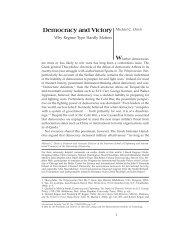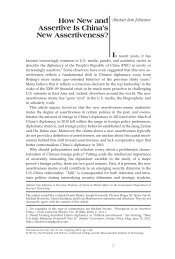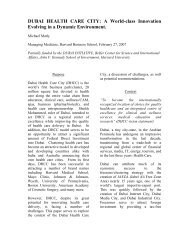The Promise and Problems of Pricing Carbon: - Belfer Center for ...
The Promise and Problems of Pricing Carbon: - Belfer Center for ...
The Promise and Problems of Pricing Carbon: - Belfer Center for ...
Create successful ePaper yourself
Turn your PDF publications into a flip-book with our unique Google optimized e-Paper software.
THE PROMISE AND PROBLEMS OF PRICING CARBON BELFER CENTER 2011-12<br />
1. Climate Change Policy Instruments <strong>for</strong> the Regional, National, or Sub-National Level<br />
We consider five generic policy instruments that could conceivably be employed by<br />
regional, national, or even sub-national governments <strong>for</strong> carbon pricing, including carbon taxes,<br />
cap-<strong>and</strong>-trade, emission reduction credits, clean energy st<strong>and</strong>ards, <strong>and</strong> fossil fuel subsidy<br />
reduction. First, however, we examine the possibility <strong>of</strong> relying on conventional environmental<br />
policy approaches, namely comm<strong>and</strong>-<strong>and</strong>-control instruments, which have dominated<br />
environmental policy in virtually all countries over the past four decades.<br />
Comm<strong>and</strong>-<strong>and</strong>-Control Regulations<br />
Conventional approaches to environmental policy employ uni<strong>for</strong>m st<strong>and</strong>ards to protect<br />
environmental quality. Such comm<strong>and</strong>-<strong>and</strong>-control regulatory st<strong>and</strong>ards are either technologybased<br />
or per<strong>for</strong>mance-based. Technology-based st<strong>and</strong>ards typically require the use <strong>of</strong> specified<br />
equipment, processes, or procedures. In the climate policy context, these could require firms to<br />
use particular types <strong>of</strong> energy-efficient motors, combustion processes, or l<strong>and</strong>fill-gas collection<br />
technologies.<br />
Per<strong>for</strong>mance-based st<strong>and</strong>ards are more flexible than technology-based st<strong>and</strong>ards,<br />
specifying allowable levels <strong>of</strong> pollutant emissions or allowable emission rates, but leaving the<br />
specific methods <strong>of</strong> achieving those levels up to regulated entities. Examples <strong>of</strong> uni<strong>for</strong>m<br />
per<strong>for</strong>mance st<strong>and</strong>ards <strong>for</strong> greenhouse gas abatement would include maximum allowable levels<br />
<strong>of</strong> CO2 emissions from combustion (<strong>for</strong> example, the grams-<strong>of</strong>-CO2-per-mile requirement <strong>for</strong><br />
cars <strong>and</strong> light-duty vehicles recently promulgated as part <strong>of</strong> U.S. tailpipe emission st<strong>and</strong>ards) <strong>and</strong><br />
maximum levels <strong>of</strong> methane emissions from l<strong>and</strong>fills.<br />
Uni<strong>for</strong>m technology <strong>and</strong> per<strong>for</strong>mance st<strong>and</strong>ards can – in principle – be effective in<br />
achieving some environmental purposes. But, given the ubiquitous nature <strong>of</strong> greenhouse gas<br />
emissions from diverse sources in an economy, it is unlikely that technology or ordinary<br />
per<strong>for</strong>mance st<strong>and</strong>ards could <strong>for</strong>m the center-piece <strong>of</strong> a meaningful climate policy.<br />
Furthermore, these comm<strong>and</strong>-<strong>and</strong>-control mechanisms lead to non-cost-effective<br />
outcomes in which some firms use unduly expensive means to control pollution. Since<br />
per<strong>for</strong>mance st<strong>and</strong>ards give firms some flexibility in how they comply, per<strong>for</strong>mance-based<br />
st<strong>and</strong>ards will generally be more cost effective than technology-based st<strong>and</strong>ards, but neither<br />
tends to achieve the cost-effective solution.<br />
2

















